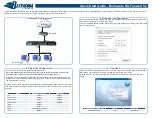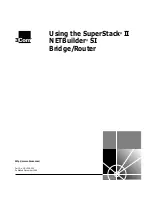
18-22
Cisco IE 3000 Switch Software Configuration Guide
OL-13018-03
Chapter 18 Configuring STP
Displaying the Spanning-Tree Status
Configuring the Transmit Hold-Count
You can configure the BPDU burst size by changing the transmit hold count value.
Note
Changing this parameter to a higher value can have a significant impact on CPU utilization, especially
in Rapid-PVST mode. Lowering this value can slow down convergence in certain scenarios. We
recommend that you maintain the default setting.
Beginning in privileged EXEC mode, follow these steps to configure the transmit hold-count. This
procedure is optional.
To return to the default setting, use the
no spanning-tree transmit hold-count
valu
e
global
configuration command.
Displaying the Spanning-Tree Status
To display the spanning-tree status, use one or more of the privileged EXEC commands in
Table 18-5
:
You can clear spanning-tree counters by using the
clear spanning-tree
[
interface
interface-id
]
privileged EXEC command.
For information about other keywords for the
show spanning-tree
privileged EXEC command, see the
command reference for this release.
Command
Purpose
Step 1
configure terminal
Enter global configuration mode.
Step 2
spanning-tree transmit hold-count
value
Configure the number of BPDUs that can be sent before pausing
for 1 second.
For
value
, the range is 1 to 20; the default is 6.
Step 3
end
Return to privileged EXEC mode.
Step 4
show spanning-tree detail
Verify your entries.
Step 5
copy running-config startup-config
(Optional) Save your entries in the configuration file.
Table 18-5
Commands for Displaying Spanning-Tree Status
Command
Purpose
show spanning-tree active
Displays spanning-tree information on active interfaces only.
show spanning-tree detail
Displays a detailed summary of interface information.
show spanning-tree interface
interface-id
Displays spanning-tree information for the specified interface.
show spanning-tree summary
[
totals
]
Displays a summary of interface states or displays the total lines of the STP
state section.
















































